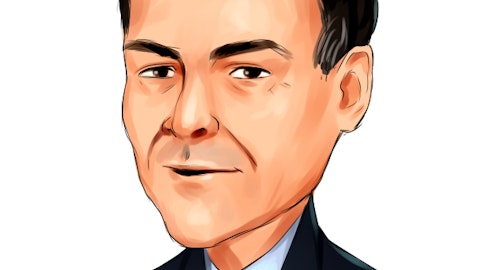Weatherford International plc (NASDAQ:WFRD) Q1 2024 Earnings Call Transcript April 24, 2024
Weatherford International plc isn’t one of the 30 most popular stocks among hedge funds at the end of the third quarter (see the details here).
Operator: Ladies and gentlemen, thank you for standing by. Welcome to the Weatherford International First Quarter 2024 Earnings Call. [Operator Instructions] As a reminder, this event is being recorded. I would now like to turn the conference over to Mohammed Topiwala, Vice President, Investor Relations and M&A. Sir, you may begin.
Mohammed Topiwala: Welcome everyone to the Weatherford International first quarter 2024 earnings conference call. I am joined today by Girish Saligram, President and CEO, and Arun Mitra, Executive Vice President and CFO. We will start today with our prepared remarks and then open it up for questions. You may download a copy of the presentation slides corresponding to today’s call from our website Investor Relations section. I want to remind everyone that some of today’s comments include forward-looking statements. These statements are subject to many risks and uncertainties that could cause our actual results to differ materially from any expectation expressed herein. Please refer to our latest Securities and Exchange Commission filings for risk factors and cautions regarding forward-looking statements.
Our comments today also include non-GAAP financial measures. The underlying details and reconciliation of GAAP to non-GAAP financial measures are included in our fourth quarter earnings press release, which can be found on our website. As a reminder, today’s call is being webcast and a recorded version will be available on our website Investor Relations section following the conclusion of this call. With that, I’d like to turn the call over to Girish.
Girish Saligram: Thanks, Mohammed and thank you all for joining our call. I will provide an overview of our operating performance, commercial and technology highlights, our view on the market, and an update on our strategic priorities. Arun will then cover the financial results and specifics on guidance before we open for Q&A. You will notice an updated format to our investor presentation as we have tried to provide additional clarity around our portfolio and differentiation. And we will reference the data and information within the presentation as part of our prepared remarks. As illustrated on Slide 3, we delivered yet another quarter of exceptional results. I remain extremely grateful to our entire One Weatherford team. And I am excited that we are developing an operating culture that provides execution differentiation.
First quarter revenue grew 15% year-over-year, driven by DRE and WCC from a segment standpoint. Our integrated services project team did an excellent job in driving efficiencies and delivered above expectations. Geographically, we once again witnessed growth driven by the strength in our international business, which was up 21% year-over-year, spearheaded by our Middle East, North Africa and Asia region, which grew 32%. While year-over-year growth is significant, we are also encouraged by sequential revenue performance that was essentially flat in a quarter that typically sees a seasonal decline. This was driven by strong performance in Latin America and North America and also aided slightly by our recent acquisitions contributing revenue for part of the quarter.
We have now had 12 consecutive quarters of year-over-year adjusted EBITDA margin expansion and Q1 represents the ninth consecutive quarter of sequential expansion. In the first quarter of 2024, adjusted EBITDA margin set another high at 24.7% driven by accelerated outcomes from our initiatives and continued rigor on the commercial, technology and operational front. The performance in the first quarter has given us the confidence and visibility to raise our margin guidance for the remainder of the year. And we now anticipate achieving our goal of 25% adjusted EBITDA margins in 2024 itself. We had indicated that our exit rate would be 25%, but now believe that we will hit that milestone on a total year basis. Importantly, we continue to see opportunities for further enhancements and we will articulate the next milestone and roadmap towards that once we have delivered the 25%.
We also successfully expanded our credit facility by $130 million to $680 million. In line with our previous commitment to pay off the 6.5% senior secured notes, we issued a notice to redeem the remaining balance. This paves the way to providing a comprehensive capital allocation framework that we intend on communicating later this year. As we have seen, the OFS sector is witnessing a degree of consolidation. And I am excited about the opportunities we see with the companies we acquired in the first quarter. I am pleased with the progress we have made so far on the integration of Ardyne, Probe and ISI into the Weatherford operating structure. The detailed planning has helped facilitate smooth transitions and ensure that we remain focused on serving customers.
While still early days, we are starting to see greater opportunities in terms of commercial benefits, increased technology cross-selling and growing adoption rates across our expanded portfolio. These headlines provide greater confidence of the long-term value creation potential of these acquisitions. Now turning to our segment overview on Slides 5 through 7, the operational and technical highlights showcase synergies between product lines, which is driven by our solutions creation mindset. In DRE, I am particularly excited about our MPD win with PDO in Oman, as this represents another example of growing MPD adoption and our technology differentiation. We are also seeing some quick wins from our acquisitions with the launch of the HB Spitfire tool as part of our wireline products portfolio.
In WCC, we continue to see significant awards through the quarter and the deployment of our pressure-balanced liner system, the Xpress XT in an offshore setting for the first time is particularly encouraging. In PRI, our focus on digital solutions has resulted in significant advancements in operational efficiency and value creation for our customers. A significant development in this segment is the commercial launch of Foresight 5.3, which combines artificial intelligence, machine learning and autonomous control for proactive failure prediction and therefore prevents ESP and rod lift failures. We will now turn to the market outlook which is laid out on Slides 9 through 11. We anticipate sustained growth in international land and offshore sectors, particularly driven by the Middle East and Latin America.
Our focus remains on production optimization, digital solutions, and exploration investments with significant potential in gas-rich regions such as Guyana and the Eastern Mediterranean and growing unconventionals in the Middle East paired with oil focused growth across major deepwater basins. The increasing adoption of managed pressure drilling, both onshore and offshore and well life extensions via interventions will play well to our strength in these areas. Additionally, responsible well management, including plug and abandonment services and growth in geothermal and carbon capture present promising opportunities. Leveraging our advanced technology suite, we are well poised to capitalize on these trends. The first quarter results validate our expectations about the market outlook that we presented in the previous quarter.
To summarize, the current stage of the upcycle is reflected by a combination of continued demand for energy, persistent investment and activity for oil and gas projects at least through the end of the decade. We continue to see the most momentum in our DRE segment with high-teens growth reflective of our continued belief in the longevity of the cycle, with growth in WCC and PRI that typically follows. Looking across our geographies for 2024, in North America, we continue to expect our Canadian business to grow in the high single-digits though there is some uncertainty around the second half driven by commodity prices. We believe the offshore Gulf of Mexico will remain stable and U.S. land business is expected to be relatively flat. On the international front, there continues to be broad strength, both offshore and onshore.

Latin America had a solid start to the year and expect growth for the year to be in the mid to high single-digit range, mainly driven by Brazil and Mexico and partially tempered by Colombia. In Europe and sub-Saharan Africa, offshore continues to be the growth driver, enabling high-teens growth led by the [indiscernible]. As previously discussed, Russia continues to be challenging and declining in revenue given the operations complexity as well as FX volatility. In the Middle East, North Africa and Asia region, we continue to remain optimistic about the growth potential and still foresee a year of high-teens growth. We believe this growth is spread across multiple countries and is backed by the investment plans of our customers. A key element of our growth has been our integrated contracts.
And as I mentioned before, I am very proud of the work the team has done and we are focused on the modulation of execution pace to drive optimal outcomes on safety, customer hookups and margins. We are also cognizant of the need for investment to support that growth. And to that end, we will continue to drive CapEx towards 5% of revenue and invest in net working capital and infrastructure support. In summary, we don’t see any material shift in our market and revenue outlook discussed a couple of months ago. The most significant risk to our outlook is driven by geopolitical events and we remain focused on safety and well-being of our employees and business continuity plans. Turning to Slide 12, I want to provide a brief update on our strategic priorities.
Our five strategic priorities of organizational vitality, creating the future, customer experience, lean operations and financial performance to be in our guardrails for driving investment and initiatives. As we deliver phases of each initiative, we revise the targets to raise the bar even higher. As you can see, we have significantly increased our spend on engineering and technology, but importantly, that has been offset in other functions, ensuring that our SG&A as a percent of revenue has continued to get more efficient. We also continue to drive simplification and process improvement into the company and the most evident result of that is in our net working capital days improved. As we conclude the first quarter of 2024, I believe our results speak clearly to the progress we have made across our organization and with our customers.
We remain confident and optimistic about Weatherford’s growth prospects as well as the potential for upward mobility in the stock with the multiple re-rate that should be reflective of top tier industry performance on margins and return on invested capital. With that, I’d like to hand it over to Arun.
Arun Mitra: Thank you, Girish. Good morning and thank you everyone for joining us on the call. Let us begin with Slide 13 and 14, where I’ll walk you through our consolidated results. Revenue for the first quarter 2024 of $1.36 billion increased 15% year-over-year and essentially flat sequentially. Operating income was $233 million compared to $185 million in the first quarter of 2023 and $216 million in the fourth quarter of 2023. Net income was $112 million compared to $72 million in the first quarter of 2023 and $140 million in the fourth quarter of 2023. You will recollect that we had some one-time tax benefits in the prior quarter that did not repeat and drove the sequential decline. Adjusted EBITDA of $336 million increased 25% year-over-year and 5% sequentially, with adjusted EBITDA margin of 24.7% or 206 basis points improvement year-over-year and 117 basis points sequentially.
Now, moving to our segment results in Slides 15 through 17. Drilling and evaluation, or DRE, revenue of $422 million increased by $50 million or 13% year-over-year, primarily from higher wireline and drilling services activity. DRE also benefited from the impact of weather-related push-out of activity in Latin America, which we’ve referenced last quarter. DRE segment adjusted EBITDA of $130 million increased by $22 million or 20% year-over-year, primarily from drilling services, managed pressure drilling and wireline. Well construction and completion or WCC revenue of $458 million increased by $37 million or 9% year-over-year, primarily due to increased completions and TRS activity in Middle East, North Africa and Asia region and offshore Latin America, partly offset by lower activity in North America.
WCC segment adjusted EBITDA of $120 million increased by $24 million or 25% year-over-year primarily from higher fall-throughs in the Middle East, North Africa and Asia region around TRS and cementation products as well as increased offshore activity in Latin America. Production and intervention or PRI revenue of $348 million was largely flat year-over-year, primarily from lower activity in North America partly offset by higher international intervention services and drilling tools activity. PRI segment adjusted EBITDA of $73 million increased by $5 million on 7% year-over-year, primarily from higher artificial lift margin and increased international activity in intervention services and drilling tools. We have previously indicated that despite the pricing pressure in North America, we remain focused on margins and will not chase volume and these segment results are a positive proof point of that intent.
Turning to Slide 18 for cash flows and liquidities. In the first quarter, we generated operating cash flow of $131 million, up $47 million year-over-year and adjusted free cash flow was $82 million, up $55 million year-over-year, a solid performance on the back of strong profitability and improved net working capital performance. Our net working capital as a percentage of last 12 months revenue was 26.1%, a 240 basis points improvement year-over-year. This progress highlights our commitment to continuously improve our working capital cycle, including ongoing internal process enhancement initiatives in billings, collections management and inventory management. We remain focused on further optimizations in the Order-to-Cash and Procure-to-Pay processes to make progress towards reaching a longer term goal of a sustainable net working capital level at 25% of revenues.
First quarter CapEx of $59 million at 4.3% of revenues, was down sequentially and year-over-year primarily due to timing. Total cash was approximately $937 million, down $46 million year-over-year. Additionally, during the quarter we repaid $167 million of 6.5% senior secured notes, bringing the total amount of 6.5% senior secured notes outstanding to $82 million as of the date of this release. Furthermore, we issued a redemption notice to repay the remaining $82 million of our 6.5% senior secured notes, which will leave us with 1.6 billion long-term notes due 2030 outstanding thereafter. We are also pleased to announce the expansion of our credit facility, which reflects the confidence and support of our banking partners and our strong operational and financial performance.
The amendment to our credit agreement provides an increase in total commitment from $550 million to $680 million by adding additional banks to the facility and provides us with create liquidity and flexibility in managing our balance sheet. Our net leverage ratio at the end of the quarter was 0.6x and marks the lowest ever level in the company in over 15 years. Turning to our guidance for second quarter and full year ‘24 on to Slide 19. For the second quarter 2024, we expect consolidated revenues to increase between 4% to 6% sequentially. Across the segments, DRE revenue is expected to grow by mid-single digits. WCC is expected to grow by high single digits and PRI is expected to grow by mid-single digits. Adjusted EBITDA for the second quarter is expected to expand by 20 to 30 basis points sequentially.
CapEx is expected to be in the range of $65 million to $80 million and adjusted free cash flow is expected to be in line with the first quarter ‘24 despite higher cash interest, cash taxes and continued net working capital investments for full year ‘24. For the full year 2024, we expect consolidated revenues to grow by double digits to low teens over full year 2023. DRE is expected to grow by high-teens, WCC to grow by high single-digits and PRI to grow by mid single-digits. Full year consolidated adjusted EBITDA margins are expected to hit our goal of 25%. CapEx for the full year is expected to be approximately 5% of revenue. We continue to expect 2024 adjusted free cash flow to be creative at $500 million despite higher CapEx, cash taxes and net working capital investments.
Thanks all for joining the call. And operator, let’s open up the call for questions, please.
See also 15 Industries with the Highest Electricity Consumption in the US and 12 Best Precious Metals Stocks to Invest In Now.
Q&A Session
Follow Weatherford International Plc (NASDAQ:WFRD)
Follow Weatherford International Plc (NASDAQ:WFRD)
Receive real-time insider trading and news alerts
Operator: Thank you. [Operator Instructions] And our first question today comes from Luke Lemoine with Piper Sandler. Please go ahead.
Luke Lemoine: Hey, good morning.
Girish Saligram: Hey, good morning, Luke.
Luke Lemoine: Hey, good morning. Girish, I know this has been said a number of times in the past, but truly congrats to you and the whole Weatherford team on the best turnaround transformation I’ve ever seen in oil service. I mean this has truly been kind of not important remarkable here with what you’ve done with the transformation.
Girish Saligram: Thank you, Luke. Appreciate it. Look, the team has done an outstanding job. I get the privilege of being the guy that gets to talk about at the moment. So – but I truly appreciate the sentiment.
Luke Lemoine: I guess with a little rounding, you hit 25% margins in 1Q, which I know has been an aspirational target for some time now. and you just brought that target forward a whole year. And then not to pin you down on the multiyear margin, but when you just look at Weatherford over the next 2 to 3 years, can you talk about what you see the company doing outside of overall market revenue growth? I mean you’ve talked about expanding MPD technology to other service lines kind of going with many pressure wells, offshore accelerating, which will boost TRS. And then among other things, you have various digital growth initiatives. Could you just kind of paint the picture on how you see Weatherford looking in 2 to 3 years.
Operator: [Operator Instructions] Everybody. Please stand by while we react to our speaker location. Please. Please proceed.
Girish Saligram: Alright. Okay. Sorry about that, everyone. My apologies. We are having some technical glitches, I guess. So Luke, I’m not sure how much of that was caught. But look, I’ll just summarize it by saying you know I think…
Luke Lemoine: Girish, I don’t think anything was caught, but yes.
Girish Saligram: Okay. Alright. Sorry about that. So Luke, on the question, Luke, you kind of say we’ll round it up, but we still haven’t gotten to 25%. What we’ve seen over the course of this year is really the initiatives that we’ve launched, and we’ve had them for a while now. We’ve gotten a lot more confidence in that. We’re starting to see the outcome of those. And we’re seeing a slightly greater magnitude, which is what’s given us the confidence to pull that target forward. As we look to the future, I’m not going to give a specific target, but look, I’ll reiterate that we’ve always talked about how we plan the business with flat activity, and we look at our role as making sure that we get margin expansion and despite flat activity of 25 to 75 basis points.
So I think it’s reasonable to assume that once we stabilize around this 25% goal, we will continue to drive margins upward. And so we’ll come back over the next few quarters and lay out more specifics around the time frame and what that next threshold is.
Luke Lemoine: Okay. Got it. And then hopefully, this next question on break the call. But on your integrated project business, this was fairly nascent just a couple of years ago. Nice margin expansion, nice growth. Could you just talk about where this goes, maybe the potential size and what’s the rate margin profile for the business?
Girish Saligram: Sure. Yes. So Luke, as I pointed out in our prepared remarks a couple of things. One is a significant part of our growth certainly has come from these integrated projects. We’ve been doing them for a while now in different places, especially in Latin America. But the 2 ones we – 2 of the ones we announced in late 2022 in Saudi Arabia and Oman have certainly added to that. We talked about this in the February call. We don’t expect to go – suddenly start doing a whole lot of this. We want to be very measured about what we do. And we will bid very selectively and maybe add 1 MAX 2 every year that is sizable and of a significant scale that it moves the needle. But we’re not focused on the number. We are much more focused on the right profile for us to execute where we can actually deliver the cash flow performance that these bring.
These projects are generally tend to be a little bit dilutive from a margin standpoint, but have terrific cash conversion and also give us a base load of activity. What we saw in the first quarter was an interesting dynamic. Our team did an outstanding job of execution. And what that really resulted in was a much higher degree of revenue and also a greater margin contribution. We don’t think that is going to be the norm. And that’s why I referenced that we will modulate space a little bit. Because we’ve also got to make sure that we are working lockstep with our customers on these projects, making sure that we are sticking to their budgets and their plans and all of that is synchronized. So we expect that rate to come down and moderate a little bit.
But again, all of that is contained within our overall guidance for the year, and it’s been a net positive relative to when we bid it.
Luke Lemoine: Okay, got it. Thanks, Girish.
Operator: Thank you. And our next question today comes from James West with Evercore ISI. Please go ahead.
James West: Hey, good morning, guys.
Girish Saligram: Good morning, James.
James West: So Girish, that you’ve got the balance sheet in excellent shape, margins are up significantly. You highlighted that the industry is in a somewhat a consolidation phase now. You’ve made two smaller acquisitions recently. How should we think about your M&A strategy going forward? Do you think it will still be more of the tuck-ins? Are there larger targets you might be interested in? Any change at all to the M&A strategy?





